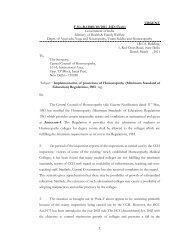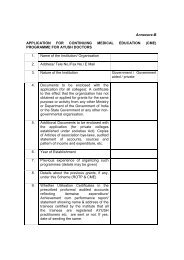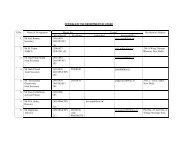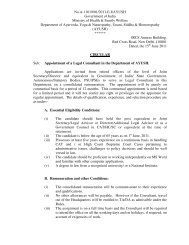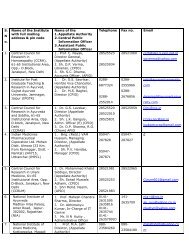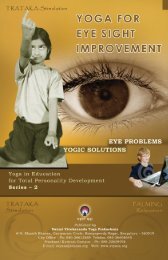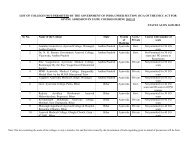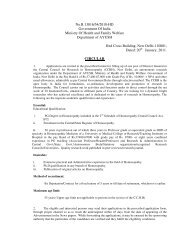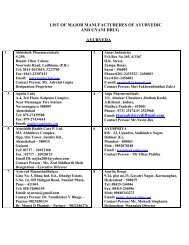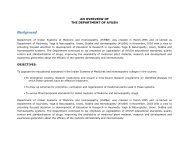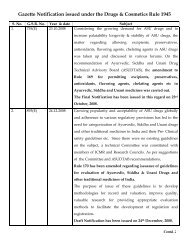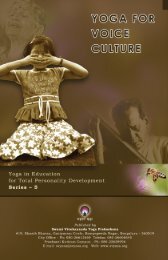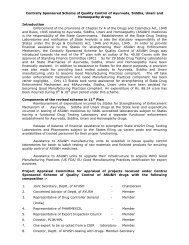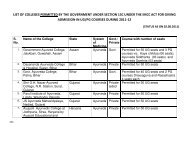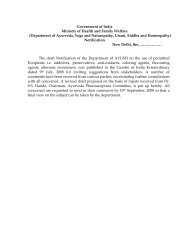INTRODUCTION INTRODUCTION The Indian System of Medicine is ...
INTRODUCTION INTRODUCTION The Indian System of Medicine is ...
INTRODUCTION INTRODUCTION The Indian System of Medicine is ...
You also want an ePaper? Increase the reach of your titles
YUMPU automatically turns print PDFs into web optimized ePapers that Google loves.
Ayurveda holds the strength to treat<br />
d<strong>is</strong>eases from hol<strong>is</strong>tic angle in accordance with<br />
the body-mind constitution and other physicpsychological<br />
attributes <strong>of</strong> the patients and as<br />
such <strong>is</strong> proven to be effective in the treatment <strong>of</strong><br />
chronic, metabolic and life style d<strong>is</strong>eases for<br />
which sat<strong>is</strong>factory solutions are not available in<br />
conventional medicine. Over the years, Kshar<br />
Sutra and Panchakarma therapies <strong>of</strong> Ayurveda<br />
have become very popular among the public.<br />
Panchakarma <strong>is</strong> a unique therapeutic procedure<br />
for the radical elimination <strong>of</strong> d<strong>is</strong>ease-causing<br />
factors and to maintain the equilibrium <strong>of</strong> humors.<br />
<strong>The</strong> Panchakarma therapy minimizes the<br />
chances <strong>of</strong> recurrence <strong>of</strong> the d<strong>is</strong>eases and<br />
promotes positive health by rejuvenating body<br />
t<strong>is</strong>sues and bio-purification. Kshar Sutra <strong>is</strong> a<br />
para-surgical intervention using an alkaline<br />
thread for cauterization, which <strong>is</strong> scientifically<br />
validated to be effective in the treatment <strong>of</strong><br />
f<strong>is</strong>tula-in-ano and such surgical conditions as<br />
require exc<strong>is</strong>ion <strong>of</strong> overgrown s<strong>of</strong>t t<strong>is</strong>sue like<br />
polyps, warts, non-healing chronic ulcers,<br />
sinuses and papillae.<br />
(ii) Unani:<br />
<strong>The</strong> Unani <strong>System</strong> <strong>of</strong> <strong>Medicine</strong> originated<br />
in Greece and passed through many countries<br />
before establ<strong>is</strong>hing itself in India during the<br />
medieval period. Th<strong>is</strong> system <strong>is</strong> based on the<br />
teachings <strong>of</strong> Hippocrates and Gallen, developed<br />
into an elaborate Medical <strong>System</strong> by Arabs. It <strong>is</strong><br />
based on well-establ<strong>is</strong>hed knowledge and<br />
practices relating to the promotion <strong>of</strong> positive<br />
health and prevention <strong>of</strong> d<strong>is</strong>eases. <strong>The</strong> Unani<br />
system became enriched by imbibing what was<br />
best in the contemporary systems <strong>of</strong> traditional<br />
medicines in Egypt, Syria, Iraq, Persia, India,<br />
China and other Middle East countries.<br />
<strong>The</strong> system <strong>of</strong> medicine was<br />
documented in Al-Qanoon, a medical Bible, by<br />
Sheikh Bu-Ali Sina (Avicena, 980-1037 AD), and<br />
in Al-Havi by Razi (Rhazes, 850-923 AD) and in<br />
many other books written by the Unani<br />
physicians. <strong>The</strong> literature <strong>of</strong> the Unani system <strong>is</strong><br />
mostly found in Arabic, Persian and Urdu<br />
languages.<br />
<strong>The</strong> Unani <strong>System</strong> <strong>is</strong> based on the<br />
Humoral theory i.e. the presence <strong>of</strong> blood,<br />
phlegm, yellow bile and black bile in a person.<br />
<strong>The</strong> temperament <strong>of</strong> a person can accordingly be<br />
sanguine, phlegmatic, choleric and melancholic<br />
depending on the presence and combination <strong>of</strong><br />
humors. According to Unani theory, the humors<br />
and medicinal plants themselves are assigned<br />
temperaments. Any change in quantity and<br />
quality <strong>of</strong> the humors, brings about a change in<br />
the status <strong>of</strong> the health <strong>of</strong> the human body. A<br />
proper balance <strong>of</strong> humors <strong>is</strong> required for the<br />
maintenance <strong>of</strong> health.<br />
Treatment in Unani cons<strong>is</strong>ts <strong>of</strong> three<br />
components namely preventive, promotive and<br />
curative. Unani system <strong>of</strong> <strong>Medicine</strong> has been<br />
found to be efficacious in conditions like<br />
Rheumatoid Arthrit<strong>is</strong>, Jaundice, Nervous Debility,<br />
Skin D<strong>is</strong>eases like Vitiligo & Eczema, Sinusit<strong>is</strong><br />
and Bronchial Asthma. For the prevention <strong>of</strong><br />
d<strong>is</strong>ease and promotion <strong>of</strong> health, the Unani<br />
<strong>System</strong> emphasizes six essentials (Asbab-e-Sitta<br />
Zarooria):- (a) pure air (b) food and water (c)<br />
physical movement and rest (d) psychic<br />
movement and rest (e) sleep and wakefulness<br />
and (f) retention <strong>of</strong> useful materials and<br />
evacuation <strong>of</strong> waste materials from the body.<br />
<strong>The</strong>re are four forms <strong>of</strong> treatment in Unani<br />
medicine- Ilaj bid Dawa (Pharmacotherapy), Ilaj<br />
bil Ghiza (Deitotherapy), Ilaj Bid Tadbir<br />
(Regimenal <strong>The</strong>rapy) and Ilaj bil Jarahat<br />
(Surgery). Regimenal <strong>The</strong>rapy (Ilaj Bid Tadbir) <strong>is</strong><br />
a special technique/ physical method <strong>of</strong><br />
treatment to improve the constitution <strong>of</strong> body by<br />
removing waste materials and improving the<br />
defense mechan<strong>is</strong>m <strong>of</strong> the body and protect<br />
health. Some <strong>of</strong> the special techniques are Fasd<br />
(Blood-letting), Hijama (Cupping), Dalk<br />
(Massage), Taleeq-e-Alaq (Leeching), Hammame-Har<br />
(Turk<strong>is</strong>h Bath), Riyazat (Exerc<strong>is</strong>e), Amal-e-<br />
Kai (Cauterization). <strong>The</strong> Unani system <strong>of</strong><br />
medicine <strong>of</strong>fers various methods <strong>of</strong> treatment<br />
which are used for specific and complicated<br />
d<strong>is</strong>eases. It emphasizes the use <strong>of</strong> naturally<br />
occurring, mostly herbal medicines and also uses<br />
some medicines <strong>of</strong> animal, marine and mineral<br />
origin.<br />
During the last 50 years, eight Post<br />
Graduate specialties have been developed-(i)<br />
Kulliyat (Basic Principles <strong>of</strong> Unani <strong>Medicine</strong>), (ii)<br />
Ilmul Advia (Pharmacology), (iii) Ilmul Saidla<br />
(Pharmacy), (iv) Tahaffuzi-wa-Samaji Tibb<br />
(Preventive and Social <strong>Medicine</strong>), (v) Moalijat<br />
(<strong>Medicine</strong>), (vi) Jarahiyat (Surgery), (vii) Ilmul<br />
Qabalat-wa-Amraz-e-N<strong>is</strong>wan (Obstetrics and<br />
Gynecology), (viii) Ilmul Atfal (Paediatrics).<br />
National Institute <strong>of</strong> Unani <strong>Medicine</strong> <strong>is</strong><br />
establ<strong>is</strong>hed in Bangalore to impart good P.G.<br />
education in Unani system.<br />
(iii) Siddha:<br />
<strong>The</strong> Siddha <strong>System</strong> <strong>of</strong> medicine <strong>is</strong> one <strong>of</strong><br />
the ancient systems <strong>of</strong> medicine in India having<br />
its close bend with Dravidian culture. <strong>The</strong> term<br />
3



